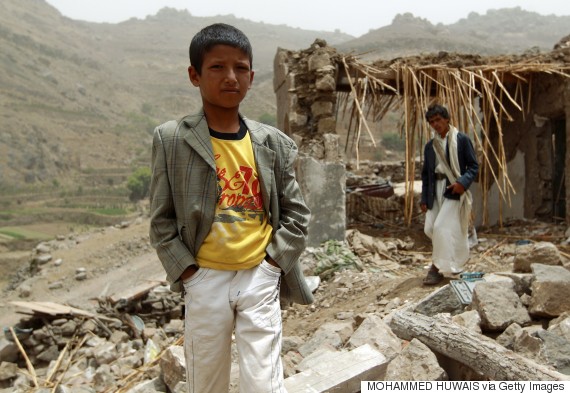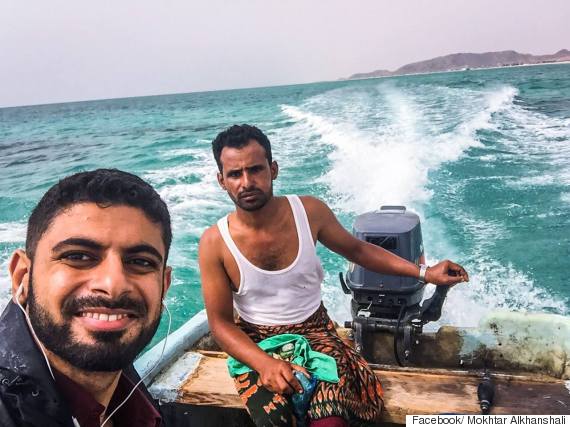Trying to get out of Yemen’s conflict alive presents some stark choices.
Airports are closed. Many roads are impassible. There is the ocean, but the crossing is dangerous and on the other side lie some of the poorest and least stable countries in Africa.
 A Yemeni boy stands in front of a house damaged by airstrikes in the village of Bani Matar, Yemen, on April 4. (MOHAMMED HUWAIS/AFP/Getty Images)
A Yemeni boy stands in front of a house damaged by airstrikes in the village of Bani Matar, Yemen, on April 4. (MOHAMMED HUWAIS/AFP/Getty Images)
A coalition led by Saudi Arabia launched airstrikes in Yemen on March 26, after months of turmoil that saw Houthi rebels capture swaths of territory, Yemen’s president flee the country and a rising number of attacks by al Qaeda and the Islamic State group. The violence has degraded Yemen’s already fragile infrastructure, leaving food, water and electricity scarce.
The United Nations says over 500 people have been killed in the airstrikes as well as fighting on the ground, including 74 children. More than 100,000 people have fled for their lives, according to the United Nations children’s agency.
“The picture on the ground is extremely bleak,” the U.N. rapporteur on internal displacement warned on Wednesday. Chaloka Beyani urged the world to prepare for “massive displacement and humanitarian crisis as conflict-torn Yemen further descends into chaos, and civilians flee the fighting.”
Yet Yemenis looking to flee the horror have few avenues of escape.
Houthi rebels, Sunni tribes and parts of the Yemeni army are locked in heavy clashes in the south. Al Qaeda has captured chunks of territory in the east. The Saudi-led coalition has imposed a no-fly zone and naval blockade and continuously bombards the capital Sanaa. Satellite images show parts of the airport in Sanaa in ruins after airstrikes.
“They had bombed the airport, imposed a no-fly zone and closed the ports. There was no way out,” Mokhtar Alkhanshali, a 26-year-old Yemeni-American from San Francisco who was working in Sanaa when the airstrikes began, told The WorldPost. The next day, after hearing that a Greek ship was evacuating foreigners, Alkhansali made a desperate decision. Despite heavy clashes around Aden, he would try to reach the port city and find a spot on the ship.
Alkhanshali’s boat never showed up, and he had to return to the capital. “The road was full of death and destruction. … It was a stupid decision to travel. I just thought there might be a way out,” he said.
 Smoke billows from a Saudi-led airstrike on Sanaa, Yemen, on Wednesday. (AP Photo/Hani Mohammed)
Smoke billows from a Saudi-led airstrike on Sanaa, Yemen, on Wednesday. (AP Photo/Hani Mohammed)
Hundreds have taken the same route, crossing the Gulf of Aden in tankers, ships and small fishing boats to reach the Horn of Africa.
Nearly 5,000 people, perhaps more, have already fled Yemen for the Horn of Africa since the airstrikes began, according to an internal document obtained by The WorldPost from a source with direct knowledge of people fleeing the violence to the Horn.
After leaving Aden and returning to the capital, Alkhanshali tried a different route, via the western Yemeni port of Mocha. After his boat failed to sail because of fuel shortages, a friend helped him secure space on a small motorboat with four other passengers.
“I was so happy that my crazy idea had actually happened,” he told The WorldPost. “But about half an hour into the journey we started feeling the waves, and I suddenly realized I’m in the middle of the Red Sea, on a small boat, with no navigation equipment and worried about Somali pirates.”
After nearly six hours, he reached the tiny African nation Djibouti. From there, he traveled home to San Francisco.
The main port in Djibouti city, the capital of Djibouti, is bustling with the new arrivals who made it out of Yemen alive. United Nations officials say they are planning for a “massive influx” of refugees into the tiny African nation and nearby Somaliland and Puntland, two autonomous regions of Somalia. Areas have already been designated for refugee camps in Somaliland and Djibouti.
The countries they are headed for are some of the most poor and unstable in the world. Somalia has been without a functioning government for more than two decades. Djibouti is more stable, but blighted by drought and unemployment. “An influx of migrants could be a big strain on these countries,” Ariane Rummery, communications officer for the United Nations refugee agency UNHCR, told The WorldPost.




